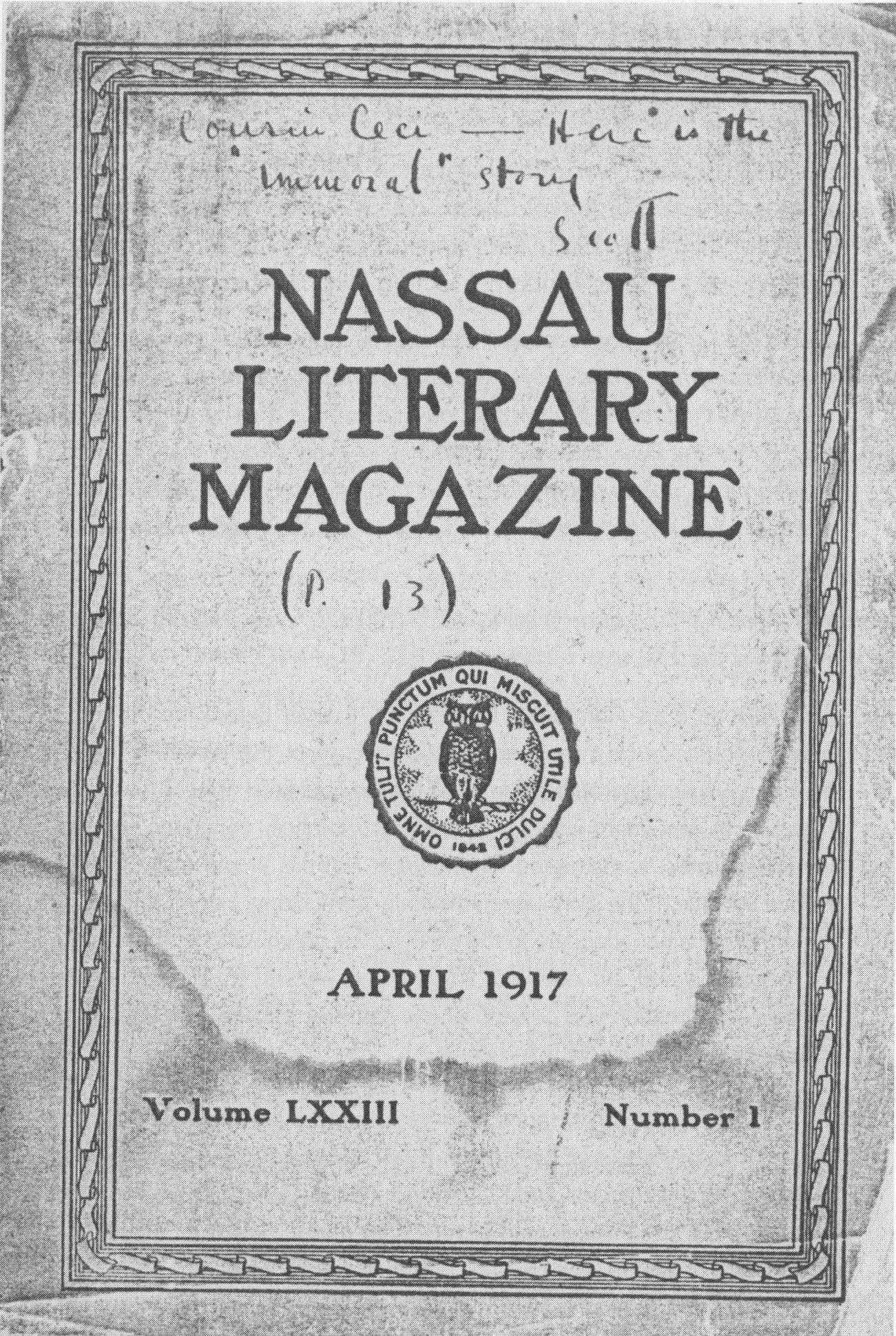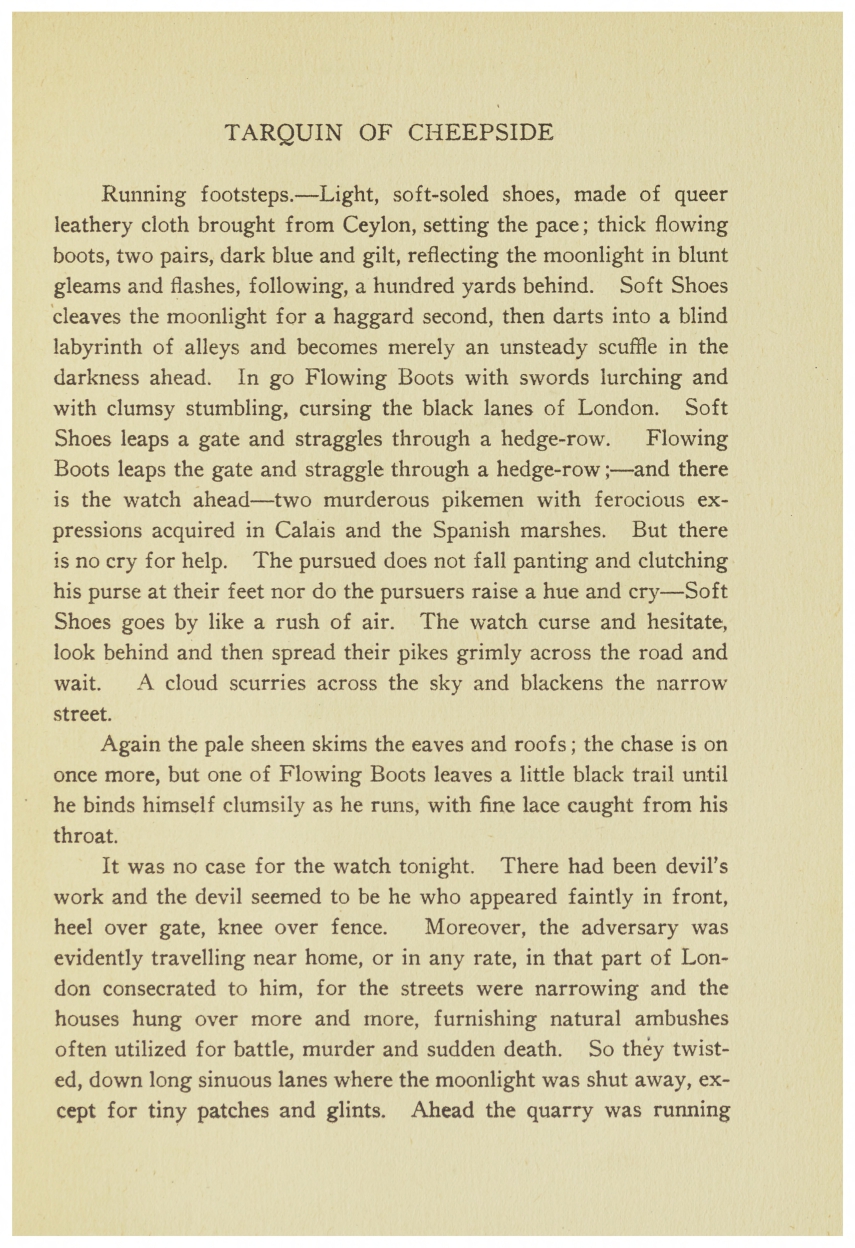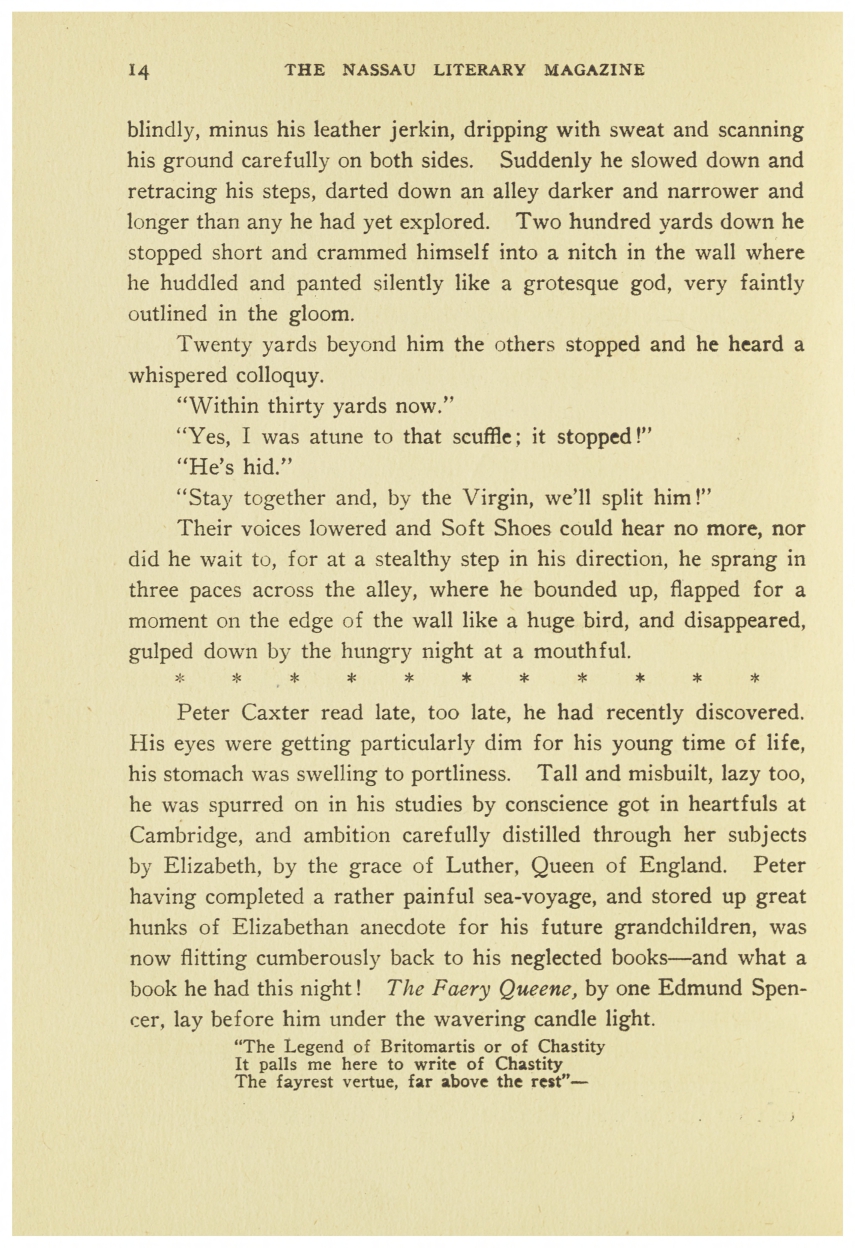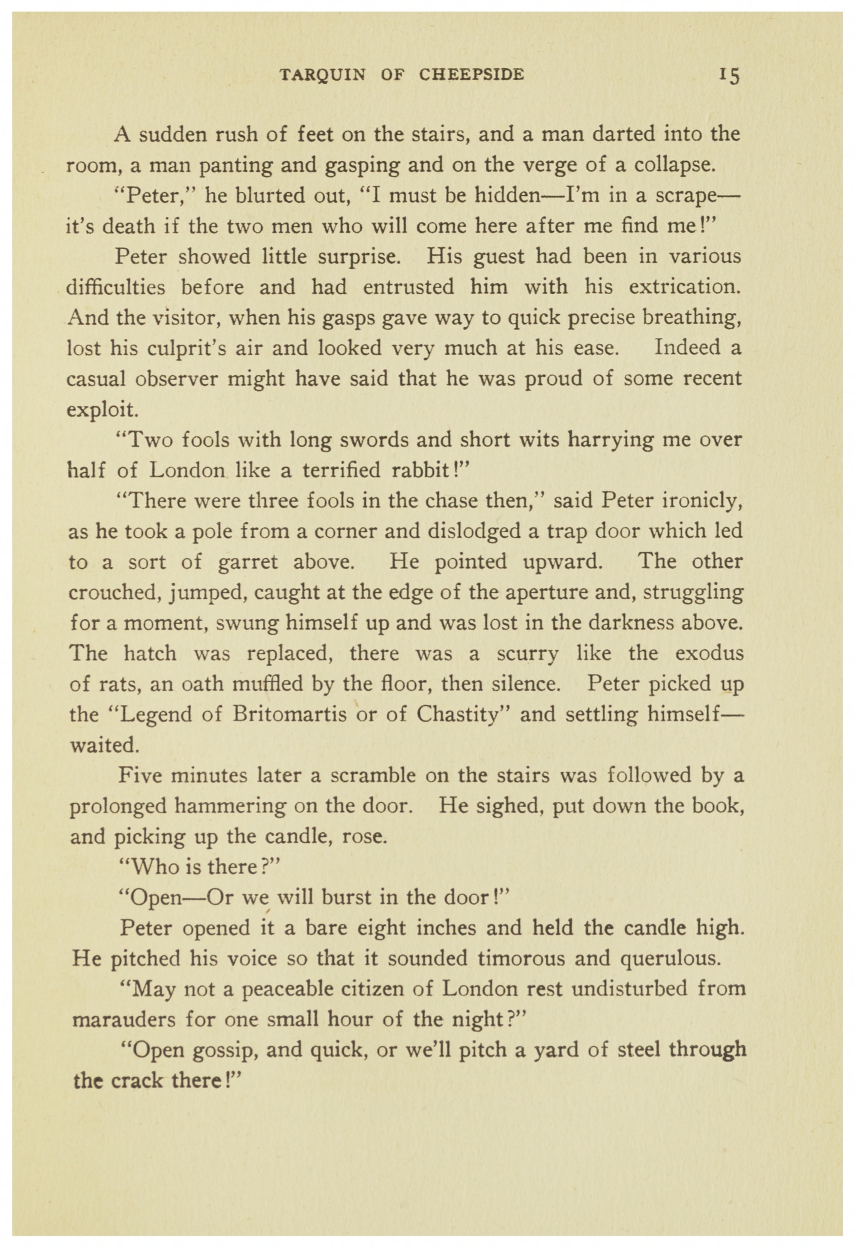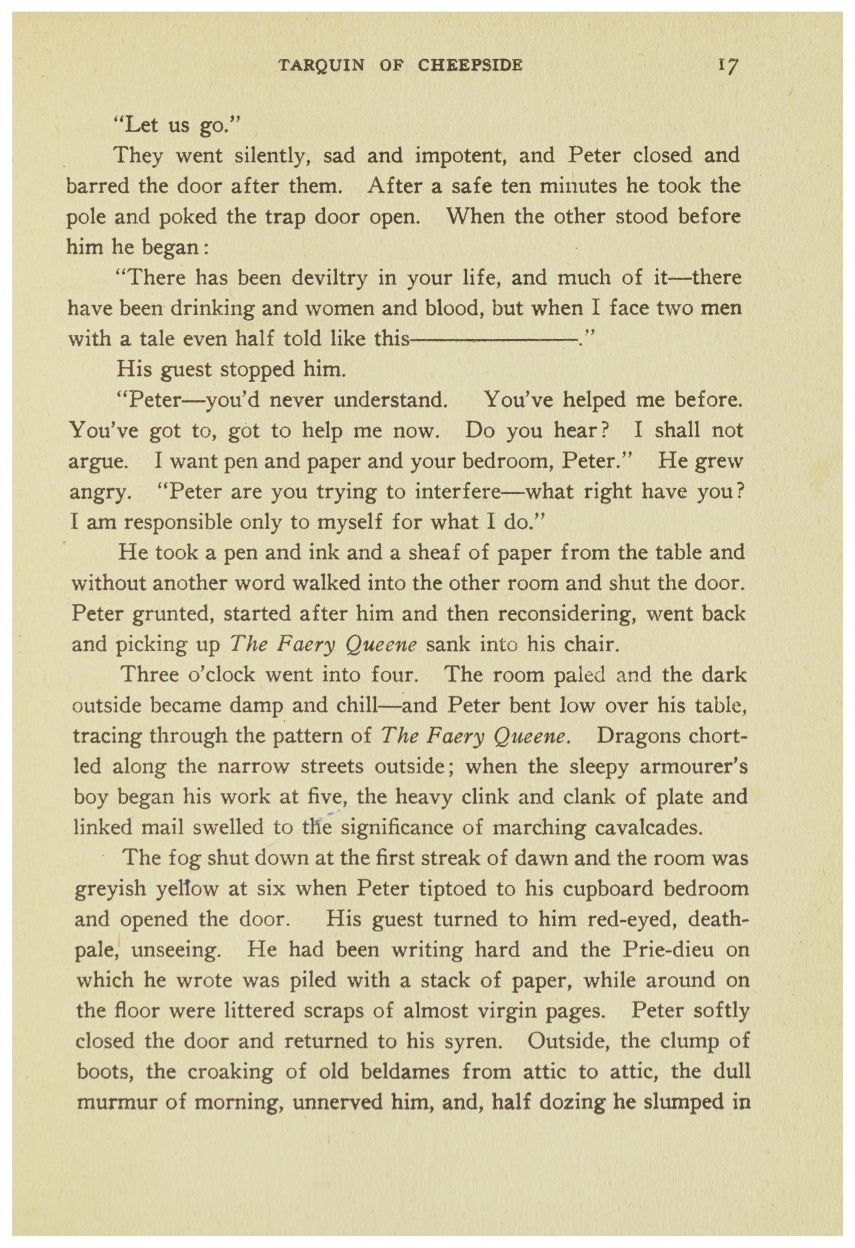
Tarquin of Cheepside
by F. Scott Fitzgerald
Running footsteps.—Light, soft-soled shoes, made of queer leathery cloth brought from Ceylon, setting the pace; thick flowing boots, two pairs, dark blue and gilt, reflecting the moonlight in blunt gleams and flashes, following, a hundred yards behind. Soft Shoes cleaves the moonlight for a haggard second, then darts into a blind labyrinth of alleys and becomes merely an unsteady scuffle in the darkness ahead. In go Flowing Boots with swords lurching and with clumsy stumbling, cursing the black lanes of London. Soft Shoes leaps a gate and straggles through a hedge-row. Flowing Boots leaps the gate and straggle through a hedge-row;—and there is the watch ahead—two murderous pikemen with ferocious expressions acquired in Calais and the Spanish marshes. But there is no cry for help. The pursued does not fall panting and clutching his purse at their feet nor do the pursuers raise a hue and cry—Soft Shoes goes by like a rush of air. The watch curse and hesitate, look behind and then spread their pikes grimly across the road and wait. A cloud scurries across the sky and blackens the narrow street.
Again the pale sheen skims the eaves and roofs; the chase is on once more, but one of Flowing Boots leaves a little black trail until he binds himself clumsily as he runs, with fine lace caught from his throat.
It was no case for the watch tonight. There had been devil’s work and the devil seemed to be he who appeared faintly in front, heel over gate, knee over fence. Moreover, the adversary was evidently travelling near home, or in any rate, in that part of London consecrated to him, for the streets were narrowing and the houses hung over more and more, furnishing natural ambushes often utilized for battle, murder and sudden death. So they twisted, down long sinuous lanes where the moonlight was shut away, except for tiny patches and glints. Ahead the quarry was running blindly, minus his leather jerkin, dripping with sweat and scanning his ground carefully on both sides. Suddenly he slowed down and retracing his steps, darted down an alley darker and narrower and longer than any he had yet explored. Two hundred yards down he stopped short and crammed himself into a nitch in the wall where he huddled and panted silently like a grotesque god, very faintly outlined in the gloom.
Twenty yards beyond him the others stopped and he heard a whispered colloquy.
“Within thirty yards now.”
“Yes, I was atune to that scuffle; it stopped!”
“He’s hid.”
“Stay together and, by the Virgin, we’ll split him!”
Their voices lowered and Soft Shoes could hear no more, nor did he wait to, for at a stealthy step in his direction, he sprang in three paces across the alley, where he bounded up, flapped for a moment on the edge of the wall like a huge bird, and disappeared, gulped down by the hungry night at a mouthful.
***
Peter Caxter read late, too late, he had recently discovered. His eyes were getting particularly dim for his young time of life, his stomach was swelling to portliness. Tall and misbuilt, lazy too, he was spurred on in his studies by conscience got in heartfuls at Cambridge, and ambition carefully distilled through her subjects by Elizabeth, by the grace of Luther, Queen of England. Peter having completed a rather painful sea-voyage, and stored up great hunks of Elizabethan anecdote for his future grandchildren, was now flitting cumberously back to his neglected books—and what a book he had this night! The Faery Queene, by one Edmund Spencer, lay before him under the wavering candle light.
The Legend of Britomartis or of Chastity
It palls me here to write of Chastity
The fayrest vertue, far above the rest—
A sudden rush of feet on the stairs, and a man darted into the room, a man panting and gasping and on the verge of a collapse.
“Peter,” he blurted out, “I must be hidden—I’m in a scrape—it’s death if the two men who will come here after me find me!”
Peter showed little surprise. His guest had been in various difficulties before and had entrusted him with his extrication. And the visitor, when his gasps gave way to quick precise breathing, lost his culprit’s air and looked very much at his ease. Indeed a casual observer might have said that he was proud of some recent exploit.
“Two fools with long swords and short wits harrying me over half of London like a terrified rabbit!”
“There were three fools in the chase then,” said Peter ironicly, as he took a pole from a corner and dislodged a trap door which led to a sort of garret above. He pointed upward. The other crouched, jumped, caught at the edge of the aperture and, struggling for a moment, swung himself up and was lost in the darkness above. The hatch was replaced, there was a scurry like the exodus of rats, an oath muffled by the floor, then silence. Peter picked up the “Legend of Britomartis, or of Chastity” and settling himself—waited.
Five minutes later a scramble on the stairs was followed by a prolonged hammering on the door. He sighed, put down the book, and picking up the candle, rose.
“Who is there?”
“Open—Or we will burst in the door!”
Peter opened it a bare eight inches and held the candle high. He pitched his voice so that it sounded timorous and querulous.
“May not a peaceable citizen of London rest undisturbed from marauders for one small hour of the night?”
“Open gossip, and quick, or we’ll pitch a yard of steel through the crack there!”
The shadows of the two gallants fell in huge wavering outlines over the moonlit stairs, and by the light Peter characterized his opponents in a quick glance. They were gentlemen, hastily but richly attired. One was a man of thirty, greatly distraught and nervous from intense excitement and anxiety. The other, the one with the bloody hand, was younger, and though he was quiet and restrained, his lips were set with grim purpose. Peter let them in.
“Is there a man hidden here?” said the elder fiercely.
“No.”
“Has there been anyone on the stairs?”
Peter replied that ten minutes ago there had been some one on the landing below trying to get into a room, but that whoever he had been, he had failed and gone away. Would they be so kind as to inform him for whom they were searching and why.
“There has been violence done—to a woman,” said the younger man slowly. “My sister—and his wife. Who we are does not matter. If you are hiding this man it may cost you your life.”
“Do you know who he—this man—is?” asked Peter quickly.
The elder man sank onto a chair and dropped his face in his hands.
“God’s Word—We do not know even that.”
Peter rather winced. This was more tragedy than he had bargained for.
The younger man had been searching about Peter’s two rooms, poking his sword into anything that looked at all suspicious. He noticed the trap door.
“What’s that?”
“It is not used,” said Peter. “It is an attic—the trap is nailed down.” Suddenly he thought of the pole and drew in his breath sharply, but the other turned away with an air of finality.
“It would take ten minutes to get up there without a ladder unless the man were a tumbler.”
“A tumbler,” repeated the elder dully.
“Let us go.”
They went silently, sad and impotent, and Peter closed and barred the door after them. After a safe ten minutes he took the pole and poked the trap door open. When the other stood before him he began:
“There has been deviltry in your life, and much of it—there have been drinking and women and blood, but when I face two men with a tale even half told like this——”
His guest stopped him.
“Peter—you’d never understand. You’ve helped me before. You’ve got to, got to help me now. Do you hear? I shall not argue. I want pen and paper and your bedroom, Peter.” He grew angry. “Peter are you trying to interfere—what right have you? I am responsible only to myself for what I do.”
He took a pen and ink and a sheaf of paper from the table and without another word walked into the other room and shut the door. Peter grunted, started after him and then reconsidering, went back and picking up The Faery Queene sank into his chair.
Three o’clock went into four. The room paled and the dark outside became damp and chill—and Peter bent low over his table, tracing through the pattern of The Faery Queene. Dragons chortled along the narrow streets outside; when the sleepy armourer’s boy began his work at five, the heavy clink and clank of plate and linked mail swelled to the significance of marching cavalcades.
The fog shut down at the first streak of dawn and the room was greyish yellow at six when Peter tiptoed to his cupboard bedroom and opened the door. His guest turned to him red-eyed, death-pale, unseeing. He had been writing hard and the Prie-dieu on which he wrote was piled with a stack of paper, while around on the floor were littered scraps of almost virgin pages. Peter softly closed the door and returned to his syren. Outside, the clump of boots, the croaking of old beldames from attic to attic, the dull murmur of morning, unnerved him, and, half dozing he slumped in his chair and his dreaming brain worked chaoticaly on the imagery that stacked it. He was on a cloud and the way to heaven lay over groaning bodies crushed near the sun. He shuddered and tread the way. He was in a wood where he killed a bird of paradise for its plumage. Some one was trying to barter his soul for the world, and the soul was bartered. When a hot hand touched his shoulder he awoke with a start. The fog was thick in the room and his guest seemed a grey ghost, made of some like misty stuff, where he stood beside him, the sheaf of paper in his hand.
“Read this, Peter, and lock it away and let me sleep until tomorrow.”
Peter took the pile and looked at it curiously. The other threw himself down full length on the couch and sank almost immediately into a deep slumber, with breathing regular, but brow wrinkled in queer corners.
Peter yawned sleepily and glanced at the scrawled first page—then he began reading aloud softly:
The Rape of Lucrece.
From the beseiged Ardea all in post,
Borne by the trustless wings of false desire,
Lust-breathing Tarquin leaves the Roman host,——
Notes
This is the version from the Nassau Literary Magazine. This text was revised by Fitzgerald in 1922 (as Tarquin of Cheapside, note the a) and included in Tales of the Jazz Age collection.
Published in Nassau Literary Magazine magazine (April 1917).
Not illustrated.
